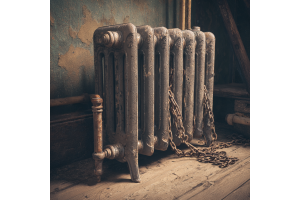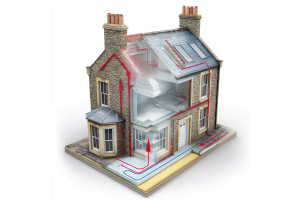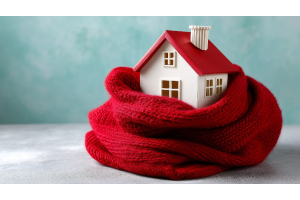
As energy prices continue to rise, homeowners are searching for ways to reduce their heating costs without sacrificing warmth and comfort. Your heating system plays a crucial role in your overall energy consumption, making efficiency a top priority. Whether you rely on central heating, electric radiators, or renewable energy solutions, optimizing your system can lead to significant savings.
In this guide, we’ll explore various ways to make your heating system more efficient, from choosing the right radiator to implementing smart energy-saving habits. By making informed decisions and adopting effective heating strategies, you can lower your energy bill while maintaining a cozy home environment.
1. Understanding Your Heating System
Introduction
A well-functioning heating system is essential for maintaining comfort and controlling energy costs. However, not all systems operate at the same level of efficiency. Understanding how your heating system works, its key components, and the factors that affect efficiency can help you make informed decisions to reduce energy waste and optimize performance.
a. Types of Heating Systems
Before optimizing your heating system, it's important to understand the different types available:
-
Central Heating Systems – Powered by gas, oil, or electricity, these systems distribute heat through radiators or underfloor heating.
-
Electric Heating – Includes electric radiators, storage heaters, and infrared panels.
-
Heat Pumps – Extract heat from the air or ground, providing an eco-friendly alternative to traditional heating.
-
Biomass Boilers – Burn organic materials like wood pellets to produce heat, reducing reliance on fossil fuels.
-
Underfloor Heating – An energy-efficient option that evenly distributes heat, making it an excellent choice for modern homes.
b. Components of a Heating System
Understanding the key components of your heating system can help you improve efficiency:
-
Boiler or Heat Source – Generates the heat required for your home.
-
Pipes and Radiators – Distribute heat throughout the rooms.
-
Thermostats and Controls – Allow you to regulate and optimize heating usage.
-
Insulation and Ventilation – Play a crucial role in retaining heat and preventing energy waste.
c. How Energy Efficiency Affects Your Bill
An inefficient heating system consumes more energy than necessary, leading to higher bills. Key factors affecting efficiency include:
-
The age and condition of your heating system.
-
The insulation quality of your home.
-
How well heat is distributed throughout your space.
-
The responsiveness of your heating controls to changing temperatures.
2. Choosing an Energy-Efficient Radiator
Introduction
Selecting the right radiator is essential for improving heating efficiency and reducing energy consumption. Radiators come in different materials, sizes, and types, each affecting how effectively they distribute heat. By understanding these differences, you can choose a radiator that keeps your home warm while minimizing energy waste.
a. Types of Energy-Efficient Radiators
Selecting the right radiator can make a significant difference in energy consumption:
-
Aluminium Radiators – Heat up and cool down quickly, offering better energy efficiency.
-
Dual-Fuel Radiators – Allow the flexibility of using both central heating and electric power.
-
Low Water Content Radiators – Require less water to operate, reducing energy use.
b. Proper Sizing and Placement
-
Use a BTU Calculator – Ensures you select a radiator with the correct heat output for your room size.
-
Avoid Blocking Radiators – Keep furniture and curtains away to allow proper heat distribution.
-
Install Radiators Under Windows – Helps counteract cold air entering through windows.
3. Optimizing Your Heating System for Efficiency
Introduction
Even the most energy-efficient heating system can underperform if not properly maintained. Regular servicing, smart heating controls, and careful temperature management are key to ensuring your system runs efficiently. By implementing these strategies, you can maximize heating output while keeping costs low.
a. Regular Maintenance and Servicing
-
Bleed Radiators – Remove trapped air to improve heating efficiency.
-
Power Flush Your System – Cleans out sludge buildup to enhance performance.
-
Check Boiler Efficiency – An old or faulty boiler can significantly increase energy costs.
b. Smart Heating Controls
-
Thermostatic Radiator Valves (TRVs) – Regulate temperature in individual rooms.
-
Smart Thermostats – Adjust heating schedules and monitor usage remotely.
-
Zoned Heating Systems – Heat only the rooms you use most frequently.
c. Lowering the Temperature
-
Reducing your thermostat by just 1°C can lower your heating bill by up to 10%.
-
Use a programmable thermostat to set lower temperatures while you're asleep or away.
4. Enhancing Home Insulation to Reduce Heat Loss
Introduction
A well-insulated home retains heat more effectively, reducing the amount of energy needed to maintain a comfortable temperature. Proper insulation not only lowers energy costs but also improves the overall efficiency of your heating system. Simple upgrades can make a big difference in keeping your home warm during winter months.
a. Draught-Proofing
-
Seal gaps around windows, doors, and floorboards to prevent heat from escaping.
-
Use thermal curtains and draught excluders for added insulation.
b. Loft and Wall Insulation
-
Loft insulation can reduce heat loss by up to 25%.
-
Cavity wall insulation retains heat, making your home warmer and reducing reliance on heating.
c. Double-Glazed Windows
-
Reduces heat loss and improves energy efficiency.
-
Blocks cold drafts, reducing the need for excessive heating.
5. Smart Habits for Lowering Heating Costs
Introduction
Small changes in daily habits can lead to significant reductions in energy consumption. By using heating efficiently, taking advantage of natural heat, and making simple lifestyle adjustments, you can enjoy a warm home while keeping your heating bills under control.
a. Use Radiators Efficiently
-
Close doors to keep heat contained in heated rooms.
-
Reflective radiator panels help redirect heat back into the room instead of being absorbed by walls.
b. Take Advantage of Natural Heat
-
Open curtains during the day to let in sunlight and naturally warm your home.
-
Close curtains at night to retain heat.
c. Layer Up Instead of Turning Up the Heat
-
Wear warm clothing indoors and use blankets instead of increasing thermostat settings.
-
Invest in heated blankets or electric throws for additional warmth.
6. Investing in Long-Term Energy-Saving Solutions
Introduction
While short-term habits can help lower your energy bill, investing in long-term energy-saving solutions provides lasting benefits. Upgrading to modern heating technology, exploring renewable energy sources, and switching to cost-effective energy tariffs can significantly improve energy efficiency and reduce heating costs in the long run.
a. Upgrade to a High-Efficiency Boiler
-
Modern condensing boilers are up to 90% efficient., significantly reducing energy waste.
-
Look for boilers with an A-rated energy efficiency label.
-
Consider a combi boiler if you have limited space, as it heats water on demand, eliminating the need for a hot water tank.
b. Consider Renewable Energy Options
-
Heat pumps extract heat from the air or ground and provide an eco-friendly alternative to traditional heating systems.
-
Solar panels can supplement your electricity needs, reducing reliance on the grid and lowering energy bills.
-
Biomass boilers burn organic materials like wood pellets, offering a renewable and cost-effective heating solution.
c. Switch to a Better Energy Tariff
-
Compare energy providers regularly to find the most cost-effective tariffs.
-
Consider time-of-use tariffs, which offer lower rates during off-peak hours.
-
Explore green energy tariffs that support renewable energy production while keeping costs competitive.
d. Smart Home Integration for Heating Efficiency
-
Integrate your heating system with a home automation system to optimize energy use.
-
Use motion sensors to adjust heating in rooms based on occupancy.
-
Install smart radiator valves that adjust temperature settings dynamically based on room usage patterns.
Final Thoughts
Lowering your energy bill doesn’t mean sacrificing warmth. By upgrading to an efficient heating system, maintaining your radiators, improving insulation, and adopting smart habits, you can significantly cut costs while keeping your home comfortable. Geyser UK offers a wide range of energy-efficient radiators and heating solutions to help you achieve maximum savings.
Explore our collection today and start saving on your energy bill!







